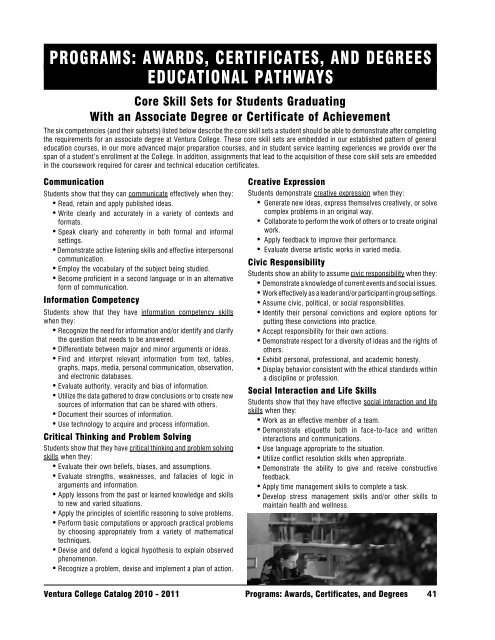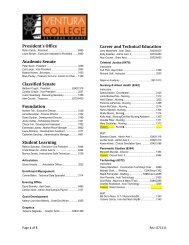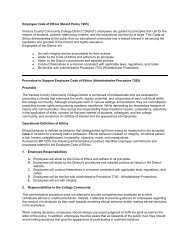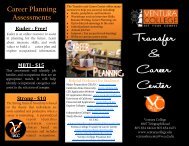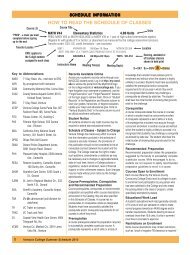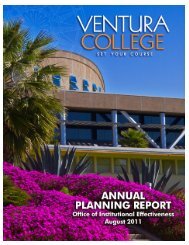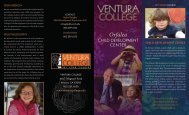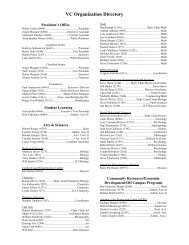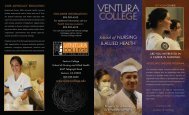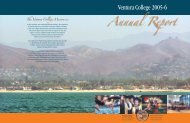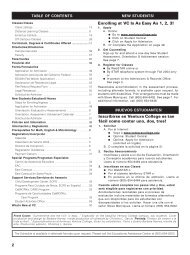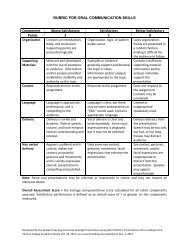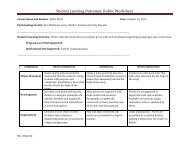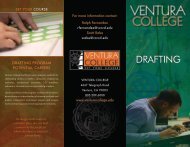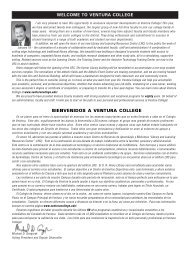2011 General CataloG & announCement of Courses - Ventura College
2011 General CataloG & announCement of Courses - Ventura College
2011 General CataloG & announCement of Courses - Ventura College
Create successful ePaper yourself
Turn your PDF publications into a flip-book with our unique Google optimized e-Paper software.
PROGRAMS: AWARDS, CERTIFICATES, AND DEGREES<br />
EDUCATIONAL PATHWAYS<br />
Communication<br />
Core Skill Sets for Students Graduating<br />
With an Associate Degree or Certificate <strong>of</strong> Achievement<br />
The six competencies (and their subsets) listed below describe the core skill sets a student should be able to demonstrate after completing<br />
the requirements for an associate degree at <strong>Ventura</strong> <strong>College</strong>. These core skill sets are embedded in our established pattern <strong>of</strong> general<br />
education courses, in our more advanced major preparation courses, and in student service learning experiences we provide over the<br />
span <strong>of</strong> a student’s enrollment at the <strong>College</strong>. In addition, assignments that lead to the acquisition <strong>of</strong> these core skill sets are embedded<br />
in the coursework required for career and technical education certificates.<br />
Students show that they can communicate effectively when they:<br />
• Read, retain and apply published ideas.<br />
• Write clearly and accurately in a variety <strong>of</strong> contexts and<br />
formats.<br />
• Speak clearly and coherently in both formal and informal<br />
settings.<br />
• Demonstrate active listening skills and effective interpersonal<br />
communication.<br />
• Employ the vocabulary <strong>of</strong> the subject being studied.<br />
• Become pr<strong>of</strong>icient in a second language or in an alternative<br />
form <strong>of</strong> communication.<br />
Information Competency<br />
Students show that they have information competency skills<br />
when they:<br />
• Recognize the need for information and/or identify and clarify<br />
the question that needs to be answered.<br />
• Differentiate between major and minor arguments or ideas.<br />
• Find and interpret relevant information from text, tables,<br />
graphs, maps, media, personal communication, observation,<br />
and electronic databases.<br />
• Evaluate authority, veracity and bias <strong>of</strong> information.<br />
• Utilize the data gathered to draw conclusions or to create new<br />
sources <strong>of</strong> information that can be shared with others.<br />
• Document their sources <strong>of</strong> information.<br />
• Use technology to acquire and process information.<br />
Critical Thinking and Problem Solving<br />
Students show that they have critical thinking and problem solving<br />
skills when they:<br />
• Evaluate their own beliefs, biases, and assumptions.<br />
• Evaluate strengths, weaknesses, and fallacies <strong>of</strong> logic in<br />
arguments and information.<br />
• Apply lessons from the past or learned knowledge and skills<br />
to new and varied situations.<br />
• Apply the principles <strong>of</strong> scientific reasoning to solve problems.<br />
• Perform basic computations or approach practical problems<br />
by choosing appropriately from a variety <strong>of</strong> mathematical<br />
techniques.<br />
• Devise and defend a logical hypothesis to explain observed<br />
phenomenon.<br />
• Recognize a problem, devise and implement a plan <strong>of</strong> action.<br />
Creative Expression<br />
Students demonstrate creative expression when they:<br />
• Generate new ideas, express themselves creatively, or solve<br />
complex problems in an original way.<br />
• Collaborate to perform the work <strong>of</strong> others or to create original<br />
work.<br />
• Apply feedback to improve their performance.<br />
• Evaluate diverse artistic works in varied media.<br />
Civic Responsibility<br />
Students show an ability to assume civic responsibility when they:<br />
• Demonstrate a knowledge <strong>of</strong> current events and social issues.<br />
• Work effectively as a leader and/or participant in group settings.<br />
• Assume civic, political, or social responsibilities.<br />
• Identify their personal convictions and explore options for<br />
putting these convictions into practice.<br />
• Accept responsibility for their own actions.<br />
• Demonstrate respect for a diversity <strong>of</strong> ideas and the rights <strong>of</strong><br />
others.<br />
• Exhibit personal, pr<strong>of</strong>essional, and academic honesty.<br />
• Display behavior consistent with the ethical standards within<br />
a discipline or pr<strong>of</strong>ession.<br />
Social Interaction and Life Skills<br />
Students show that they have effective social interaction and life<br />
skills when they:<br />
• Work as an effective member <strong>of</strong> a team.<br />
• Demonstrate etiquette both in face-to-face and written<br />
interactions and communications.<br />
• Use language appropriate to the situation.<br />
• Utilize conflict resolution skills when appropriate.<br />
• Demonstrate the ability to give and receive constructive<br />
feedback.<br />
• Apply time management skills to complete a task.<br />
• Develop stress management skills and/or other skills to<br />
maintain health and wellness.<br />
<strong>Ventura</strong> <strong>College</strong> Catalog 2010 - <strong>2011</strong> Programs: Awards, Certificates, and Degrees 41


